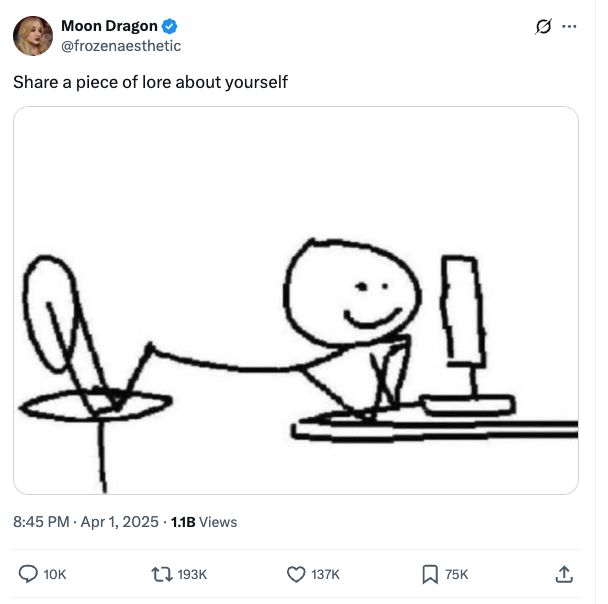On April 1st, someone named Moon Dragon posted a question on Twitter:

Just one question.
And an MS Paint-quality doodle.
That post has now been viewed over a billion times.
A billion.
Not part of a marketing campaign. Not amplified by celebrities. It wasn’t even trying very hard.
It was just a good question.
Why Did It Go So Far?
Because it made people want to answer.
The word lore is doing subtle, brilliant work. It doesn’t want you to tell your greatest hit or your proudest achievement. It’s looking for the oddly specific, slightly unhinged story that only your closest friends know.
Everyone has that one odd story.
The detour. The drama. The thing only your oldest friends know.
And that post gave people permission to share it.
Sometimes, that’s all it takes.
We’ve Stopped Asking Interesting Questions
Not the kind that make you pause.
Not the kind that invite a story.
Not the kind that feel like they’re meant for you, not just anyone.
Most of the time, questions are functional.
They keep life moving, but they don’t stop you in your tracks.
Even online, we’ve been trained to expect questions that are either algorithm bait or small talk in disguise.
“How’s everyone doing today?”
“Coffee or tea?”
“Describe your day with an emoji.”
Fine. Harmless. But forgettable.
So when someone asks something unexpected—something specific and open-ended—it lands differently. It doesn't demand an answer. It invites one.
And people respond to that.
If You Work in Sales, This Should Make You Pause
Because most outbound messages aren’t built on curiosity. They’re built on proof.
- “We help companies increase productivity by 24%.”
- “Just checking in on my last note.”
- “Are you the right person to speak to?”
They sound like someone playing a role. Not a person starting a conversation.
The truth is, people rarely reply to a value prop.
But they often reply to a good question.
Not because they’re being polite.
Because they want to answer.
What Does a Good Question Look Like?
It sounds like it was written by someone who knows what your work actually feels like.
It doesn’t overreach. It doesn’t perform.
It just… gets it.
Instead of:
“Are you exploring new tools this quarter?”
🟢 Try:
“What’s something your team keeps duct-taping together because fixing it properly feels too messy?”
Instead of:
“Just following up…”
🟢 Try:
“What’s the tradeoff your team keeps making between doing it fast and doing it right?”
Instead of:
“We automate manual workflows.”
🟢 Try:
“Which part of your job still feels like it’s stuck in 2011?”
Instead of:
“Open to a quick call this week?”
🟢 Try:
“If someone could take one task off your plate this week, what would you happily never touch again?”
Instead of:
“We integrate seamlessly with your tools.”
🟢 Try:
“What’s one tool everyone pretends to like but secretly dreads opening?”
Instead of:
“Do you struggle with X?”
🟢 Try:
“Who usually gets blamed when this breaks, even when it isn’t really their fault?”
These questions don’t sound like they’re pulled from a CRM sequence.
They sound like they were written by someone who has done the job, or at least paid close attention.
And that makes all the difference.
People Usually Reply to a Good Question
It’s not a trick.
It’s not a growth hack.
It’s just how people work.
We’re wired to respond to things that make us feel seen, or at the very least, understood.
That’s what that billion-view post did.
It didn’t shout. It didn’t sell.
It just asked a question worth answering.
If you’re trying to reach someone, whether you’re selling, recruiting, or just hoping for a reply, start there.
Not with the pitch.
With the question.















.svg)